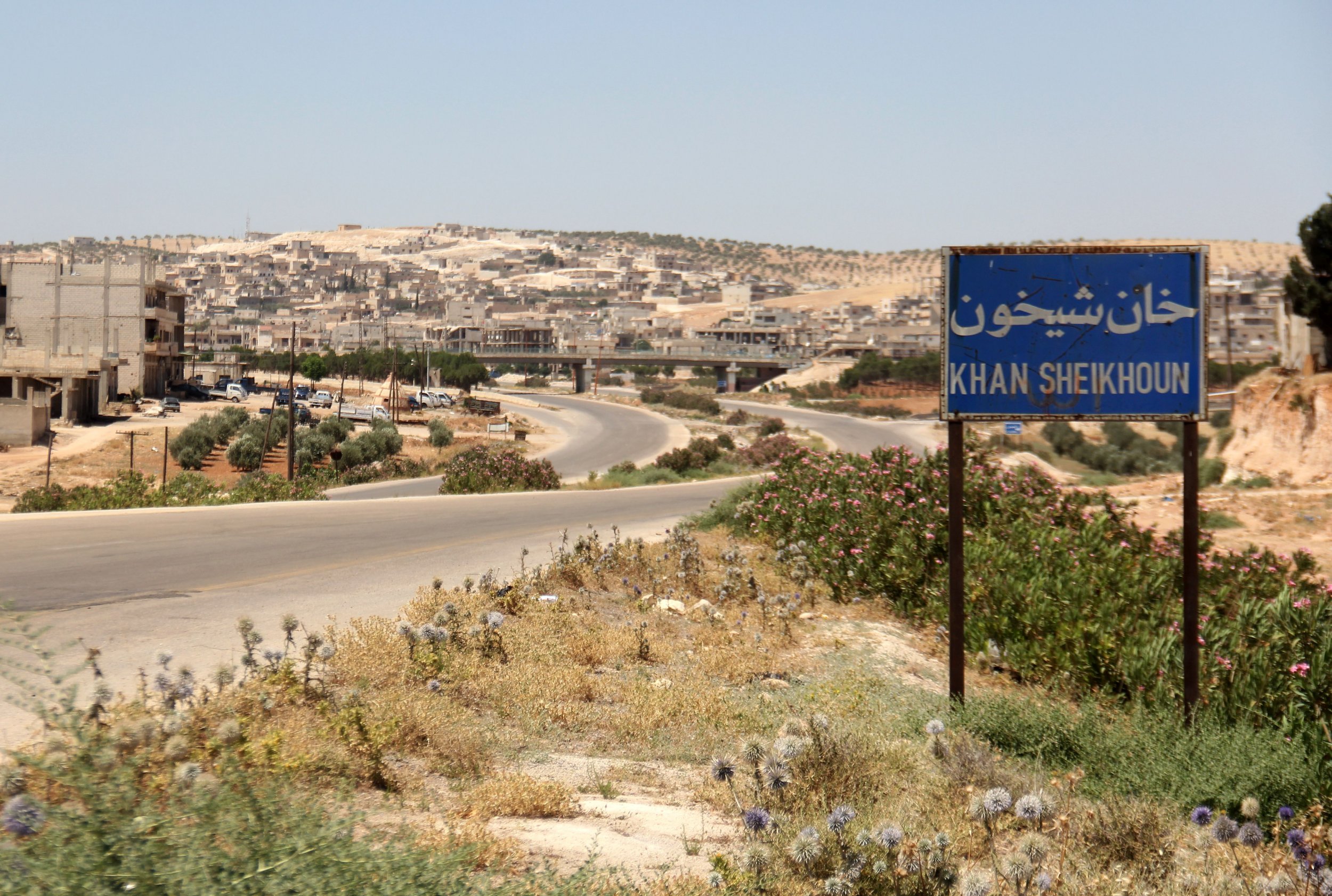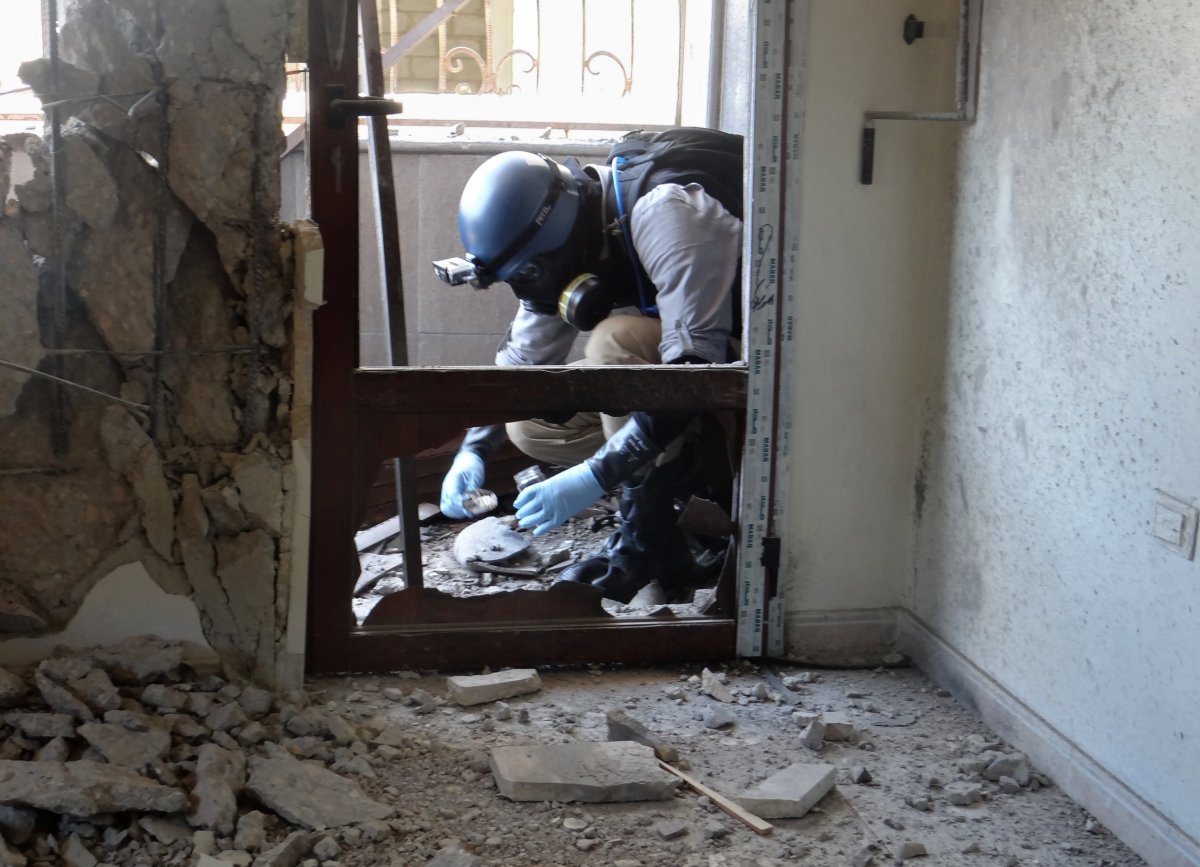
Syria has claimed that Israeli jets bombed a government military compound Thursday, killing two people, but the facility near Masyaf, in Homs Province, is no ordinary base: it is where a Western intelligence service and monitoring groups believe Bashar Al-Assad is developing a chemical weapons stockpile in violation of a 2013 commitment.
The airstrike—which Israel has not confirmed—came just one day after United Nations war crimes investigators blamed the regime for a deadly April attack in which it was accused of using sarin gas against civilians in the town of Khan Sheikhoun, Idlib Province. The U.N. Commission of Inquiry on Syria claims Assad has used chemical agents more than two dozen times in Syria's six-year-long war.
While the agents allegedly used in that attack may or may not have emanated from the base near Masyaf in Hama province, the complex appears to have been targeted for its role in the war strategy of the Assad regime. Here's what we know about the military base and its ties to chemical weapons production.
Hezbollah Stockpile
The complex acts as a branch of the Scientific Studies and Research Center, or SSRC. A government agency, it acts as a base for the Syrian military in the center of the country.
Assad and his loyalists deny any use of chemical weapons but the United States and the U.K.-based monitoring group the Syrian Observatory for Human Rights, which monitors the war in Syria, says that the site is central to chemical weapons production. German reports have alleged that the site is where the nerve agents VX, sarin and tabun are manufactured.
SOHR said the complex also houses rockets and that both Iran and the Lebanese Shiite militant group Hezbollah, a key ally of Assad and arch-enemy of Israel, have had a presence at the base. Israel is reported to have carried out previous strikes in Syria with the aim of stopping Iranian deliveries of missiles to Hezbollah in Syria.
The war has allowed Hezbollah to grow in strength and Israel is concerned that it is now facing the threat of the group on two fronts, on its northern border of the Golan Heights, a territory it seized from Syria in the 1967 Six-Day War, and on its northern border of Lebanon, where it fought a war in 2006.
The former head of Israel's Military Intelligence Amos Yadlin tweeted on Thursday that the attack allegedly carried out by Israel "was not routine." He said the base "produces chemical weapons and explosive barrels that have killed thousands of Syrian civilians." He said that if Israel was behind the raid, it would "be a commendable and moral action by Israel against the slaughter in Syria." Yadlin assessed that the attack sends the message that "Israel won't allow for empowerment and production of strategic arms."
Israel has largely remained out of the Syrian war, but it says that weapons deliveries to Hezbollah are a red line. The leader of the Shiite militant group Hassan Nasrallah last week traveled to Damascus to meet with Assad for discussions that he said were about the battle against the Islamic State militant group (ISIS). Israel was also conducting a military drill in the north of the country.

Sanctioned Employees
The Assad regime disputes these claims and argues that the Masyaf base is only a civilian research institute, not used for Iranian deliveries or for chemical weapons development.
But an unidentified Western intelligence agency passed a document to the BBC in May that the Assad regime was continuing to produce chemical and biological munitions at the site. It said that Assad's key allies in the civil war, Iran and Russia, have knowledge of the regime's chemical weapons production.
It said that as well as the Masyaf site, the regime is using two other compounds for its chemical weapons production: Dummar and Barzeh, both on the outskirts of the Syrian capital, Damascus.
It named a senior official, Basam Hassan, as a key figure in the chain of command who had ordered the use of chemical weapons in the war. The U.S. sanctioned Hassan in May 2014, saying that he held the rank of Brigadier General and explaining his role at the alleged chemical warehouse.
"Al-Hassan has a number of duties within the Syrian Government, including acting as the Syrian Presidential Representative to Syria's Scientific Studies and Research Center (SSRC), which is the government agency responsible for developing and producing non-conventional weapons and missiles," a U.S. Treasury release said.
The Organization for the Prohibition of Chemical Weapons, the OPCW, has inspected several of the Assad regime's sites alleged to have produced chemical agents in weaponized form, including Masyaf. But the intelligence agency says that the production was continuing at the site in "closed sections," according to the BBC.
Employees at the site, as well as the two other suspected chemical compounds, have been widely sanctioned by the U.S. After the Khan Sheikhoun attack, which the U.N. says killed 89 people, the U.S. blacklisted 271 workers from the SSRC. It said the agency is complicit in the production of weapons of non-convention warfare, and their delivery to the battlefield.
The compound lies around 60 kilometres east of the Syrian coastal city of Tartus in one of Assad's key heartlands in the city's western provinces. It also lies close to Russia's biggest air base in the country, Hmeimim, in Latakia province, which the Assad regime is leasing to Moscow.
By the terms of a U.S.-Russian-brokered deal in 2013, the Syrian regime should have no chemical weapons or agents in its possession. In 2015, the OPCW, the world's chemical weapons watchdog, said that all of Syria's chemical weapons arsenal had been destroyed. Assad agreed to the plan in September 2013, after uproar from the international community about an alleged chemical weapons attack on the Damascus suburb of Ghouta, which killed as many as 1,400 people, according to a report by the Syrian-American Medical Society, or SAMS.
Assad is alleged to have used chemical weapons as a key component of his battle to retain control of territory, or wrestle it back, from rebels opposed to his rule. Video footage has emerged throughout the Syrian civil war showing alleged victims of chemical weapons attacks frothing at the mouth, shivering and with dilated pupils, all symptoms of coming into contact with a chemical agent that attacks the nervous system.
Uncommon Knowledge
Newsweek is committed to challenging conventional wisdom and finding connections in the search for common ground.
Newsweek is committed to challenging conventional wisdom and finding connections in the search for common ground.
About the writer
Jack is International Security and Terrorism Correspondent for Newsweek.
Email: j.moore@newsweek.com
Encrypted email: jfxm@protonmail.com
Available on Whatsapp, Signal, Wickr, Telegram, Viber.
Twitter: @JFXM
Instagram: Read more
To read how Newsweek uses AI as a newsroom tool, Click here.








